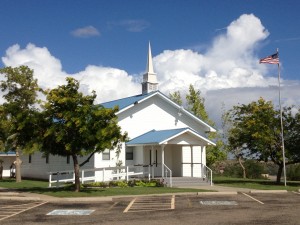Out of the elevator and rounding the corner on the 2nd floor of Carillon House, Emma spots her first.
“Daddy, look! There’s Hazel!” Annie and Emma take off running to give her a hi and a hug.
At the other end of the long hall, sitting in her wheelchair, is Hazel. She came here a couple months ago after suffering a stroke. A Southern belle originally from Baton Rouge, her soft Louisiana voice is charm school sweet and dipped in Mint Julep.
During our first conversation the topic of her age came up. Her daughter told me she was 93.
“Hazel,” I said, “I’m gonna take you to the fair and make a lot of money having people guess your age because there’s no way you’re 93.”
“Why, thank you.” Her smile seemed to agree that I’d make bank.
Hazel’s memory has been affected by the stroke. Almost like a sporadic dementia. Some days we visit without difficulty. On this day, her short-term memory has stepped out for a bit. She is slowly wringing her hands; anxious, fretful and nervous.
“I’m hoping they’ll come for me. If I sit here I think I’ll see them. I hope they find me.”
Her daughter Nita is running errands and will be back in an hour or two. Hazel has forgotten that. She squeezes her hands together and leans forward in the direction of the elevator, anxiously looking for the familiar face that will put her heart at ease.
Emma pats her shoulder. “It’s ok, Hazel. We’re right here.”
Perhaps a distraction will help. “Hazel, I’m sure Nita will be back soon. You can hang out with us while we put out the flowers. Why don’t you come along with us to the rooms. Emma can push your wheelchair.”
“I can push you, Hazel.” Emma grabs the handles and Annie puts a hand on her shoulder.
Hazel is lost in her worry. “I hope they come for me. Because I’m here. I hope they come for me.” She looks up at me with tears in her eyes. “I’m right here, you know.”
“I know, Hazel. And we’re right here with you.” And we are. But we’re not sure if today is a day that Hazel can know that.
We begin putting out the flowers. Hazel doesn’t want to move, afraid she might miss whomever she is hoping for to come around the corner.
We make our rounds, visiting with our elderly friends while replacing last week’s roses with fresh ones. By the time we get around to Hazel’s room, a nurse’s aide has helped her into bed. Her demeanor is changed. She seems relaxed. At peace. I wonder what happened to make it so.
She points to Annie and Emma with excitement. “They found me! I was waiting for someone to find me. And they found me!” Hazel is happy now.
Making certain she has my attention, she points to Annie and Emma. “These are my precious little girls. They are my fairy princesses. I see their angel faces in my dreams.”
I don’t doubt that she does.
As I turn to leave for the next room, Hazel reaches up and squeezes my hand. Hard. With a relieved smile she says, “I’m so happy to be found.”
Sometimes we wander through our days oblivious that we are lost. Sometimes we feel lost and we’re fearful that what is comforting and familiar to us will never return. Sometimes we’re running hard away, knowing full well we are lost but afraid of what will happen if we stop long enough to admit it.
However it happens, being lost is scary.
Saying goodbye to the patient in the last room, I go looking for Annie and Emma. I hear crazy loud laughter coming from Hazel’s room.
Peeking in I see the three of them playing volleyball with a balloon. Hazel, laying down in her bed says, “Oh, girls, you’ve got to hit it harder than that. You’ve got to really smack it!”
Smack!
Hazel serves up a high floater.
The girls giggle and trip over themselves, whacking it back to her. The volley goes between them till Hazel’s return puts the balloon out of reach, stuck in the lamp.
“Hazel!”, the girls shriek, “What a shot!”
Hazel is proud. She showed them how to really smack it.
I step quietly away. It would be a sin to stop this game.
More giggles. More “smacks!”. More laughter.
Indeed, it is a happy thing to be found.
“Then Jesus told them this parable: “Suppose one of you has a hundred sheep and loses one of them. Does he not leave the ninety-nine in the open country and go after the lost sheep until he finds it? And when he finds it, he joyfully puts it on his shoulders and goes home. Then he calls his friends and neighbors together and says, “Rejoice with me; I have found my lost sheep. I tell you that in the same way there will be more rejoicing in heaven over one sinner who repents than over ninety-nine righteous persons who do not need to repent.”
– Luke 15:1-7
Todd A. Thompson – April 7, 2008


